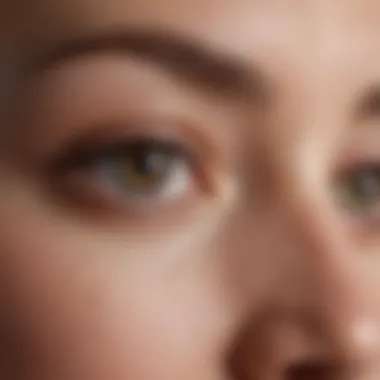Unveiling the Complexity of Severe Eyelid Eczema: Causes, Symptoms, Treatment, and Prevention Insights


Insider Beauty Tips
Severe eyelid eczema poses a significant challenge to many individuals, affecting both physical appearance and overall quality of life. Understanding the causes behind this condition is crucial in developing effective management strategies. *
- Maintaining Optimal Hygiene: Keeping the eyelids clean is paramount in managing eczema. Use gentle, non-irritating cleansers to remove debris and prevent bacterial overgrowth.
- Moisturizing Consistently: Regular application of hypoallergenic moisturizers can help alleviate dryness and reduce itching.
- Avoiding Triggers: Identifying and avoiding triggers such as harsh cosmetics, allergens, or extreme weather conditions can prevent flare-ups.
Remember, a proactive approach to skincare is key to managing severe eyelid eczema effectively.
Product Reviews
For individuals dealing with severe eyelid eczema, selecting appropriate skincare products is essential. Here are some recommendations to consider:
- Gentle Cleansers: Opt for mild, fragrance-free cleansers to avoid further irritation.
- Hydrating Moisturizers: Look for moisturizers enriched with soothing ingredients like aloe vera or ceramides.
- Sensitive Skin Sunscreens: Protect your delicate skin with mineral-based sunscreens that are gentle yet effective.
Make wise choices with skincare products to promote healing and minimize discomfort.
Makeup Trends
Though makeup usage may be limited for individuals with severe eyelid eczema, staying updated on the latest trends can still be enjoyable. Here are some insights to consider:
- Minimalist Makeup: Embrace simple, skin-friendly makeup looks that prioritize skincare over heavy products.
- Emphasis on Skincare: Opt for makeup products that offer skincare benefits, such as hydrating foundations or antioxidant-rich lipsticks.
- Consideration for Allergies: Choose hypoallergenic makeup options to minimize the risk of irritation.
Celebrity inspiration can serve as a guide for elegant and understated beauty looks suitable for sensitive skin.
Beauty Industry News
Stay informed about new product launches, collaborations, and events within the beauty industry. Networking with professionals and fellow enthusiasts can provide valuable insights and opportunities for growth.
- Exciting Collaborations: Keep an eye out for collaborations between skincare brands and dermatologists to create innovative solutions for skin conditions like eczema.
- Industry Events: Attend beauty events that focus on skincare sensitivities to learn about cutting-edge treatments and product advancements.
Engage with the beauty community to stay abreast of emerging trends and developments, enhancing your knowledge and connection within the industry.


Preface to Severe Eyelid Eczema
This article embarks on a journey into the realm of severe eyelid eczema, a condition that can deeply impact one's quality of life. Understanding the nuances of this ailment is crucial in devising effective management strategies and treatment plans. We will unravel the complex web of causes, symptoms, treatment options, and preventive measures associated with severe eyelid eczema, equipping readers with valuable insights to navigate this challenging terrain.
Definition of Severe Eyelid Eczema
Severe eyelid eczema, medically known as atopic dermatitis, is a chronic inflammatory skin disorder characterized by red, itchy, and inflamed eyelids. This condition can lead to significant discomfort and aesthetic concerns, impacting the overall well-being of individuals affected by it. The delicate nature of the eyelid skin makes managing severe eczema in this area particularly challenging, requiring specialized care and attention.
Importance of Addressing Severe Eyelid Eczema
Addressing severe eyelid eczema is paramount not only for physical health but also for mental and emotional well-being. Untreated eczema can exacerbate symptoms over time, leading to prolonged suffering and reduced quality of life. By proactively managing this condition, individuals can alleviate discomfort, improve self-confidence, and prevent potential complications. Seeking professional guidance for severe eyelid eczema is essential to develop a personalized treatment plan tailored to individual needs.
Impact on Quality of Life
The impact of severe eyelid eczema on quality of life extends beyond physical symptoms, affecting various aspects of daily living. The persistent itchiness and inflammation can disrupt sleep patterns, hinder social interactions, and impair productivity. Moreover, the visible manifestations of eczema on the eyelids may cause self-consciousness and emotional distress. By understanding the broader implications of severe eyelid eczema, individuals can prioritize holistic care approaches that not only address the physical symptoms but also enhance overall well-being.
Causes of Severe Eyelid Eczema
In this section, we delve into the fundamental aspects of Severe Eyelid Eczema. Understanding the causative factors is crucial for devising effective treatment plans. By isolating the triggers, we can target them directly, leading to better management of this condition. Genetic predisposition, environmental influences, and allergic responses play pivotal roles in the onset and exacerbation of Severe Eyelid Eczema.
Genetic Predisposition
Genetic predisposition to Severe Eyelid Eczema underscores the hereditary component of this skin condition. Individuals with a family history of eczema are more susceptible to developing Severe Eyelid Eczema. Certain gene variations can predispose individuals to heightened skin sensitivity and reactivity, making them prone to eczema flare-ups. Understanding one's genetic predisposition can aid in early detection and proactive management strategies.
Environmental Triggers
Environmental triggers encompass a wide range of external factors that can instigate or worsen Severe Eyelid Eczema. Exposure to irritants like harsh chemicals, allergens, and pollutants can trigger inflammatory responses in the delicate skin around the eyes. Additionally, changes in weather patterns, humidity levels, and sun exposure can impact the severity of eczema symptoms. Identifying and minimizing exposure to these triggers is essential in managing Severe Eyelid Eczema effectively.
Allergic Reactions
Allergic reactions play a significant role in the pathogenesis of Severe Eyelid Eczema. Sensitivities to various substances, including pet dander, pollen, dust mites, and certain foods, can elicit allergic responses in the form of eczema flare-ups. Understanding one's specific allergens through diagnostic testing is crucial for implementing avoidance strategies. Managing allergic triggers is instrumental in preventing recurrent episodes of Severe Eyelid Eczema and maintaining skin health.
It is essential to conduct thorough investigations to pinpoint individual triggers and tailor treatment plans accordingly.


To delve deeper into the complexities of Severe Eyelid Eczema, recognizing the interplay between genetic predisposition, environmental factors, and allergic responses is paramount. By addressing these underlying causes, we pave the way for a more targeted and comprehensive approach to managing this challenging skin condition.
Symptoms and Diagnosis
Symptoms and diagnosis play a crucial role in understanding severe eyelid eczema. By identifying the common symptoms and conducting diagnostic procedures, individuals can effectively manage this condition. Symptoms typically include redness, itching, swelling, and crusting of the eyelids. These symptoms can significantly impact one's quality of life, underscoring the importance of timely diagnosis and appropriate treatment. Identifying these symptoms early can lead to proactive management and better outcomes in the long run.
Common Symptoms of Severe Eyelid Eczema
Common symptoms of severe eyelid eczema encompass itching, burning sensation, redness, and swelling of the eyelids. These symptoms often lead to discomfort and may affect daily activities such as applying makeup or wearing contact lenses. Understanding these symptoms is crucial in differentiating severe eyelid eczema from other eye conditions, allowing for targeted treatment and management strategies.
Diagnostic Procedures
Diagnostic procedures, such as Skin Patch Testing and Biopsy, are instrumental in confirming severe eyelid eczema. Skin Patch Testing involves applying various allergens to the skin to determine specific triggers causing eczema flare-ups. This test aids in identifying allergens and formulating an avoidance plan to prevent future episodes. Although time-consuming, Skin Patch Testing provides valuable insights into personalized treatment approaches.
Biopsy, on the other hand, entails the removal of a small skin sample for microscopic examination. This procedure helps in ruling out other skin conditions that mimic eczema and confirming the diagnosis of severe eyelid eczema. By analyzing skin tissue at a cellular level, healthcare providers can tailor treatment regimens to target the root cause of eczema, enhancing treatment efficacy and patient outcomes. Integrating these diagnostic procedures in the management of severe eyelid eczema is crucial for accurate diagnosis and personalized care.
Treatment Options
Treatment options are imperative in the management of severe eyelid eczema. They play a pivotal role in alleviating symptoms and improving the quality of life for individuals grappling with this condition. Understanding the diverse array of treatment modalities empowers patients and healthcare providers to make informed decisions that align with the specific needs of each case. This section will delve into the key treatment options highlighted in this article, shedding light on their mechanisms, benefits, and considerations.
Topical Steroids
Topical steroids represent a cornerstone in the treatment of severe eyelid eczema. These medications, available in various potencies, exhibit anti-inflammatory properties that help reduce redness, itching, and swelling on the eyelids. It is crucial to follow a prescribed regimen to avoid potential side effects such as skin thinning and discoloration. Consistency and monitoring are paramount when using topical steroids to ensure effectiveness while mitigating risks associated with prolonged usage.
Moisturizers and Emollients
Incorporating moisturizers and emollients into the daily skincare routine is essential for individuals with severe eyelid eczema. These products help restore the skin's barrier function, trap moisture, and prevent evaporation, consequently reducing dryness and itchiness. Opt for fragrance-free and hypoallergenic formulas to minimize the risk of adverse reactions. Regular application of moisturizers and emollients promotes skin hydration and soothes irritation, enhancing overall comfort and well-being.
Immunosuppressants
Immunsuppressants serve as a viable treatment option for severe cases of eyelid eczema that do not respond adequately to other interventions. Two main categories of immunosuppressants commonly prescribed include calcineurin inhibitors and corticosteroids. Calcineurin inhibitors, such as tacrolimus and pimecrolimus, modulate immune responses in the skin, thereby reducing inflammation and symptoms. While effective, prolonged use may heighten the risk of skin cancer and require close monitoring. Corticosteroids, on the other hand, exert potent anti-inflammatory effects but can lead to skin atrophy and steroid-induced dermatitis with prolonged use. A careful balance between efficacy and potential side effects is crucial in the judicious use of immunosuppressants for severe eyelid eczema.
Preventive Measures


In the realm of severe eyelid eczema, preventive measures serve as the sentinel guarding against exacerbation and recurrence. Understanding the pivotal role of preventive strategies is crucial in alleviating the burden this condition imposes. By incorporating preventive measures into daily habits, individuals can proactively manage their symptoms and enhance their quality of life. The sanctity of preemptive action cannot be overstated; it is the cornerstone of effective eczema control.
When delving into the specifics of avoiding triggering factors, a meticulous approach is paramount. Identifying and circumventing elements that instigate eczema flare-ups is akin to crafting a personalized shield against discomfort. From environmental allergens to skincare products, eradicating these triggers becomes a non-negotiable practice for those battling severe eyelid eczema. Each individual must embark on a journey of self-discovery, pinpointing their unique triggers to fortify their defense mechanisms.
Proper eyelid hygiene emerges as a beacon of hope in navigating the treacherous waters of severe eyelid eczema. By embracing gentle cleansing rituals and steering clear of harsh chemicals, individuals can nurture their delicate eyelid skin. Cultivating a daily regimen that prioritizes cleanliness without aggression is key to maintaining eczema remission. Adopting soothing formulations and mild cleansers transforms skincare routines into therapeutic experiences, steering clear of potential irritants that could reignite eczema woes.
Dietary considerations wield profound influence in the realm of severe eyelid eczema. The adage 'you are what you eat' echoes resoundingly in the context of skin health. Opting for anti-inflammatory foods rich in omega-3 fatty acids and antioxidants can wield a shield against eczema manifestations. Steering clear of potential triggers such as dairy and gluten may prove instrumental in quelling inflammation within the body. By fostering a symbiotic relationship between nutrition and skincare, individuals can foster an internal environment conducive to skin healing and resilience.
Lifestyle Modifications
Lifestyle modifications play a crucial role in managing severe eyelid eczema effectively. By integrating specific changes into one's daily routines, individuals can significantly reduce the frequency and severity of eczema flare-ups. Adopting a holistic approach that encompasses stress management techniques, sleep hygiene practices, and avoiding irritants is key to enhancing overall skin health. By prioritizing lifestyle adjustments, individuals can complement medical treatments and achieve long-term relief from eyelid eczema.
Stress Management Techniques
Effectively managing stress is paramount in controlling severe eyelid eczema. High levels of stress can exacerbate skin conditions, including eczema, leading to increased inflammation and itching. Implementing stress-reducing activities such as mindfulness meditation, deep breathing exercises, and yoga can help regulate the body's response to stress and minimize eczema symptoms. Engaging in regular physical activity and maintaining a healthy work-life balance are also essential in promoting mental well-being and reducing stress levels.
Sleep Hygiene Practices
Maintaining good sleep hygiene is essential for individuals with severe eyelid eczema. Quality sleep plays a crucial role in skin regeneration and immune function, aiding in the body's ability to repair and recover from eczema-related damage. Establishing a consistent sleep schedule, creating a relaxing bedtime routine, and ensuring a comfortable sleep environment can contribute to better sleep quality. Avoiding caffeine and electronic devices before bedtime, as well as managing stress levels, can further enhance the effectiveness of sleep hygiene practices.
Avoiding Irritants
Identifying and avoiding irritants is central to managing severe eyelid eczema. Exposure to harsh chemicals, fragrances, and environmental pollutants can trigger eczema flare-ups and worsen existing symptoms. By using gentle, fragrance-free skincare products and avoiding known irritants such as certain makeup ingredients, individuals can prevent unnecessary aggravation of their eyelid eczema. Building awareness of potential triggers and making informed choices regarding personal care products are essential steps in creating an environment conducive to healthy skin.
Epilogue
Understanding severe eyelid eczema is crucial for individuals dealing with this challenging condition. Through this article, we have delved into the intricate details of severe eyelid eczema, shedding light on its causes, symptoms, treatment, and prevention methods. By grasping the underlying triggers and employing suitable management techniques, individuals can significantly enhance their quality of life while managing this chronic issue effectively.
Key Takeaways
- Genetic predisposition, environmental triggers, and allergic reactions play significant roles in the development of severe eyelid eczema.
- Proper diagnosis through skin patch testing and biopsy is crucial for effective treatment.
- Treatment options include topical steroids, moisturizers, emollients, and immunosuppressants like calcineurin inhibitors and corticosteroids.
- Preventive measures like avoiding triggering factors, maintaining proper eyelid hygiene, and considering dietary adjustments can help in managing the condition.
- Lifestyle modifications such as stress management, good sleep hygiene, and avoiding irritants can alleviate symptoms and prevent flare-ups.
Importance of Proactive Management
In dealing with severe eyelid eczema, proactive management is key to controlling symptoms and preventing exacerbation of the condition. By adopting preventive measures and adhering to proper treatment guidelines, individuals can minimize the impact of eczema on their daily lives. Prevention is always better than cure holds particularly true in the case of severe eyelid eczema, emphasizing the significance of taking proactive steps to manage this chronic issue.
Seeking Professional Guidance
While self-care strategies are valuable, seeking professional guidance is paramount in effectively managing severe eyelid eczema. Dermatologists and allergists can provide expert advice tailored to individual needs, ensuring proper diagnosis, treatment, and long-term care. Professional guidance offers personalized approaches that consider specific triggers and symptoms, leading to more targeted and effective management strategies.







